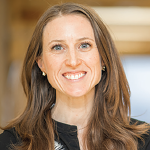Although rheumatologists often refer young patients to arthritis camps, some families learn of the camps through the Arthritis Foundation. Fees for the camps vary, although most camps cover costs through donations and offer the experience to juvenile arthritis patients and their families for free or at a minimal cost.
For many young campers, Dr. Lovell says, arthritis camp marks their first time away from home, as well as a chance to interact with other kids who have arthritis.
“Often, parents don’t feel comfortable leaving their child with a chronic condition at a sleepaway camp,” Dr. Lovell says. “At juvenile arthritis camps, we reassure parents their kids are in a safe medical home and a supportive social and emotional environment. In addition, the experience allows campers to learn how to manage their condition and advocate for themselves.”
Campers aren’t the only ones who benefit from the experience. Dr. Lovell says that by volunteering at camps, rheumatologists gain the opportunity to observe pediatric patients outside the scope of the medical clinic setting.
“Typically, you might see a patient for 30 minutes every three to six months,” Dr. Lovell says. “At arthritis camp, doctors can see their patients during a 24-hour period and get a better sense of any challenges they may face.”
Dr. Lovell says some kids may tell their rheumatologists they’re doing fine, but at camp it’s obvious they’re experiencing joint stiffness or soldiering through activities despite being in pain. He adds that seeing pediatric patients throughout the day and night, engaging in a variety of activities, allows doctors to assess how well they are actually doing and to make modifications in their young patients’ treatment plans.
“Maybe their treatment program isn’t as effective as it could be,” Dr. Lovell says. “Sometimes, a small change in their regimen can help reduce inflammation or pain they [may] be experiencing.”
The rheumatologists volunteering at camp are rheumatology fellows and faculty members, Dr. Lovell says.
“We teach kids how to give themselves injections and develop strategies for coping with their disease,” Dr. Lovell says. “After dinner, we typically host an informal gathering where the kids can discuss disease manifestations, research updates, emotional bullying or how to best manage medications.”
Many counselors at arthritis camps were once campers themselves, and Dr. Lovell says they understand and empathize with the challenges kids face in coming to terms with their arthritis. Some kids who attend arthritis camp have been newly diagnosed. Others may have been coping with juvenile arthritis for several years, but haven’t had the opportunity to interact with other kids and teens who share their challenges.



